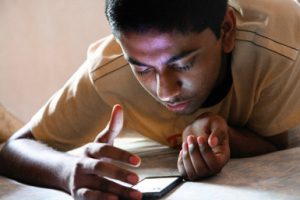The BBC’s new initiative to help secondary school children identify real news and spot fake news could be a game-changing tool for helping children navigate their way through the digital world.
I know from speaking to children myself that they are often more savvy about what they see on the internet and social media than perhaps many adults might think. A recent National Literacy Trust study backs that up. It found that while one in five children believe everything they read online is true, four in five do not. It’s clear many secondary school children have already developed a healthy scepticism about what they see and read online. Yet at the same time, the sheer volume of online content, real and fake, that many children are bombarded with grows ever bigger.
We now live in a world where rumour and untruth, disguised as fact, can travel around the globe literally at the click of a button. All of us, even adults, are often unsure what is true and what isn’t – and it’s unlikely the ‘fake news’ trend will be just a passing phase. As something that could be part and parcel of the digital lives all of us, it’s vital we teach children from an early age that not everything they see online can be trusted.
Of course, that doesn’t mean we should be spoon-feeding uncritical children ‘mainstream’ news and expecting them not to question what they’re being told. Even some stories from ‘mainstream’ platforms could have been produced by people with their own distinctive agendas. It is actually about making sure children are given the opportunities and resources to develop critical-thinking skills and are taught how to spot the stuff that’s made up and that is designed specifically to mislead and create divisions in our society.
Earlier this year, I published my report ‘Growing Up Digital’, which set out the important role digital citizenship should be playing in schools. In the report, I wanted to broaden the conversation away from just ‘internet safety’ towards more active resilience-building in children. As part of that, we set out proposals for ensuring all children are educated about their digital rights in a way that chimes with their real life experiences. Some of those digital citizenship lessons could focus on looking at what makes something fake news, and help children to develop skills encouraging them to analyse the news they read and hear, for example teaching them how to double-check facts against different sources and understand which sources are more likely to be trustworthy. It could also build resilience in children so they have the confidence to report and flag up fake news, helping to break the cycle of its distribution.
We also need to see more from the internet giants, who after all play such a big part in the lives of children. They have to take more responsibility for what children are reading on their sites and do more to stop fake news being circulated on their platforms. I support proposals for a social media levy to fund better protection of children, which could even include giving children better resources for learning to spot fake news, alongside greater transparency from the internet companies about how they deal with fake news on their own platforms.
If we want children to thrive and make the most of the brilliant innovations the digital world gives them, it is more important than ever that we make sure they have the information and the skills they need to make informed choices.






